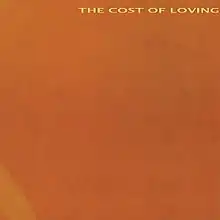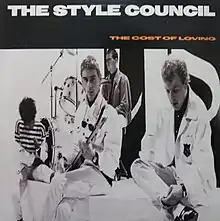The Cost of Loving
The Cost of Loving is the third studio album by English band The Style Council. It was originally released in February 1987.[2] The album was recorded over a period of three months in 1986, at Solid Bond Studios (owned by their lead vocalist, Paul Weller). The album is generally regarded as the culmination of the smoother, more adult-oriented sound of the band's later work. The album peaked at number 2 in the UK charts, and achieved gold status from the BPI. It featured the singles "It Didn't Matter" and "Waiting", which had corresponding music videos. "It Didn't Matter" reached the top 10 in the UK charts, however "Waiting" failed to make the top 40, which was a first for any Style Council single.
| The Cost of Loving | ||||
|---|---|---|---|---|
 UK cover | ||||
| Studio album by | ||||
| Released | 7 February 1987 | |||
| Recorded | May, August and October 1986 | |||
| Studio | Solid Bond Studios | |||
| Genre | Soul[1] | |||
| Length | 42:12 | |||
| Label | Polydor | |||
| Producer | Paul Weller | |||
| The Style Council chronology | ||||
| ||||
| Alternative cover | ||||
 US cover | ||||
On release, The Cost of Loving received mixed reviews from music journalists. Today, the album is generally seen as a turning point in the band's career, leading to the sounds later explored on Confessions of a Pop Group and Modernism: A New Decade, whilst also signalling the start of the band's declining commercial and critical success. The band themselves have been quite vocal in being less satisfied with the album.
Production and recording
This album saw the group concentrating on the R&B styles that had been growing in America during the eighties. The album included a cover of "Angel," a song originally recorded by Anita Baker. Its urban contemporary feel was a jolt to listeners who had grown accustomed to the continental mix of soul music, jazz, and European folk styles that the band had displayed on their previous two albums. United States label Geffen Records heard the tracks and promptly dropped The Style Council from their roster. Socially conscious soul music pioneer Curtis Mayfield was asked to mix some of the material on the album, which displays hints of being influenced by house music and the Jimmy Jam and Terry Lewis sound. Tracks from the album were included in a 37-minute film, Jerusalem, about the band.
Cover art
The initial British pressings of the album were conceived and issued as two 12" EPs in a gatefold sleeve (designed by Simon Halfon with ideas from Paul Weller). Polygram records would eventually issue the album Stateside without its much-maligned International Orange jacket design. When asked by Uncut magazine whether the album cover was intended as "a citric version of The Beatles' White Album?", Weller replied that "the only thing" he "can say in its defence is that it's in some book as one of the top 100 album sleeves."[3]
Critical reception
| Review scores | |
|---|---|
| Source | Rating |
| AllMusic | |
| Q | |
| Record Collector | |
| The Rolling Stone Album Guide | |
| Sounds | |
| Uncut | 5/10[8] |
In a retrospective review for AllMusic, critic Stephen Thomas Erlewine wrote, "Filled with bland, professional soul-pop, few of the songs have memorable melodies and the band tends to meander through the slick arrangements." He further noted that "Weller's lyrics were self-important and under-developed, with only the hit single 'It Didn't Matter' making a lasting impression among the undistinguished songs that comprised the majority of the album."[1]
In 1991, the NME included the album in a list of fourteen albums that "should've been an EP".[9]
Track listing
All tracks are written by Paul Weller, except where noted
| No. | Title | Writer(s) | Length |
|---|---|---|---|
| 1. | "It Didn't Matter" | 5:44 | |
| 2. | "Right to Go" |
| 5:10 |
| No. | Title | Length |
|---|---|---|
| 3. | "Heavens Above" | 6:10 |
| 4. | "Fairy Tales" | 4:08 |
| No. | Title | Writer(s) | Length |
|---|---|---|---|
| 5. | "Angel" |
| 4:31 |
| 6. | "Walking the Night" | 4:30 |
| No. | Title | Length |
|---|---|---|
| 7. | "Waiting" | 4:26 |
| 8. | "The Cost of Loving" | 4:19 |
| 9. | "A Woman's Song" | 3:02 |
| Total length: | 42:12 | |
Personnel
- Paul Weller – lead and background vocals; guitars; synthesizers; drum programming
- Mick Talbot – acoustic and electric pianos, Wurlitzer and Hammond organs; synthesizers; bass synthesizer
- Dee C. Lee – lead and background vocals
- Steve White – drums; percussion
- The Dynamic Three – rapping on "Right to Go"
- Steve Sidelynk – percussion on "Right to Go", congas on "Heavens Above" and "Fairy Tales"
- Camelle Hinds – bass guitar on "Heavens Above", "Angel" and "Walking the Night"
- Billy Chapman – saxophone on "Heavens Above"
- Anne Stephenson – violin on "Heavens Above"
- Guy Barker – trumpet on "Fairy Tales"; flugelhorn on "Walking the Night"
- Roddy Lorimer – trumpet on "Fairy Tales"; flugelhorn on "Walking the Night"
- Luke Tunney – trumpet on "Fairy Tales"; flugelhorn on "Walking the Night"
- Ashley Slater – trombone on "Fairy Tales"
- Chris Lawrence – trombone on "Fairy Tales"
- Pete Thams – trombone on "Fairy Tales"
- John Valentine – backing vocals on "Walking the Night"
- John Mealing – orchestral arrangements
- Jezar – engineer, sequencing, mixer on "Right to Go"
- Alan Leeming – engineer, mixer on "The Cost Of Loving"
- Paul Weller – producer
- The Valentine Brothers – mixers on "It Didn't Matter" and "Angel"
- Matthew Kasha – mixer on "Heavens Above"
- Curtis Mayfield – mixer on "Fairy Tales"
- Carl Beatty – mixer on "Walking the Night"
- John Valentine – mixer on "Waiting"
Charts
| Chart (1987) | Peak position |
|---|---|
| Australian Albums (Kent Music Report)[10] | 24 |
| Canada Top Albums/CDs (RPM)[11] | 58 |
| Dutch Albums (Album Top 100)[12] | 23 |
| German Albums (Offizielle Top 100)[13] | 45 |
| Japanese Albums (Oricon)[14] | 6 |
| New Zealand Albums (RMNZ)[15] | 35 |
| Swedish Albums (Sverigetopplistan)[16] | 46 |
| UK Albums (OCC)[17] | 2 |
| US Billboard 200[18] | 122 |
Certifications
| Region | Certification | Certified units/sales |
|---|---|---|
| United Kingdom (BPI)[19] | Gold | 100,000^ |
|
^ Shipments figures based on certification alone. | ||
See also
References
- Citations
- Erlewine, Stephen Thomas. "The Cost of Loving – The Style Council". AllMusic. Retrieved 31 October 2020.
- NME. London, England: IPC Media: 3. 10 March 1984.
{{cite journal}}: Missing or empty|title=(help) - Lester, Paul (December 1998). "Last Man Standing". Uncut. No. 19. Retrieved 15 March 2016.
- Quantick, David (September 2017). "Vogue Trader". Q. No. 376. p. 118.
- Wilson, Lois; Shirley, Ian (June 2020). "The Changing Man". Record Collector. No. 506. pp. 78–88.
- Coleman, Mark (2004). "The Style Council". In Brackett, Nathan; Hoard, Christian (eds.). The New Rolling Stone Album Guide (4th ed.). Simon & Schuster. p. 789. ISBN 0-7432-0169-8.
- Murphy, Kevin (7 February 1987). "The Price of Fame?". Sounds. p. 34.
- Troussé, Stephen (October 2017). "The Style Council". Uncut. No. 245. pp. 42–44.
- NME November 1991 issue.
- Kent, David (1993). Australian Chart Book 1970–1992 (illustrated ed.). St Ives, N.S.W.: Australian Chart Book. p. 299. ISBN 0-646-11917-6.
- "Top RPM Albums: Issue 0798". RPM. Library and Archives Canada. Retrieved 31 October 2020.
- "Dutchcharts.nl – The Style Council – The Cost of Loving" (in Dutch). Hung Medien. Retrieved 31 October 2020.
- "Offiziellecharts.de – The Style Council – The Cost of Loving" (in German). GfK Entertainment Charts. Retrieved 31 October 2020.
- Okamoto, Satoshi (2006). Album Chart Book: Complete Edition 1970–2005. Oricon. ISBN 978-4-87131-077-2.
- "Charts.nz – The Style Council – The Cost of Loving". Hung Medien. Retrieved 31 October 2020.
- "Swedishcharts.com – The Style Council – The Cost of Loving". Hung Medien. Retrieved 31 October 2020.
- "Official Albums Chart Top 100". Official Charts Company. Retrieved 31 October 2020.
- "The Style Council Chart History (Billboard 200)". Billboard. Retrieved 31 October 2020.
- "British album certifications – Style Council – The Cost of Loving". British Phonographic Industry. Retrieved 2 April 2022.
External links
- The Cost of Loving at Discogs (list of releases)